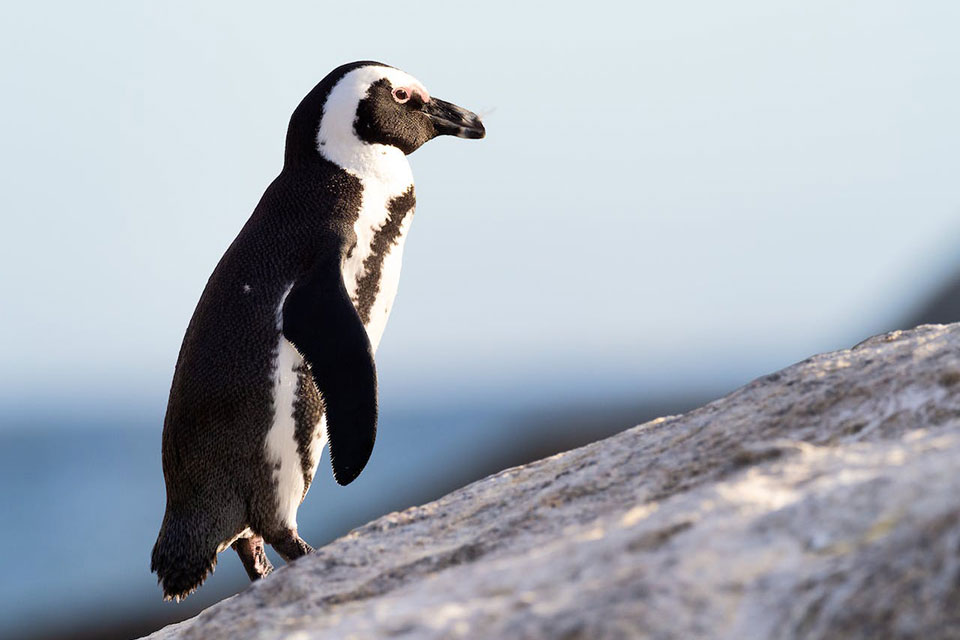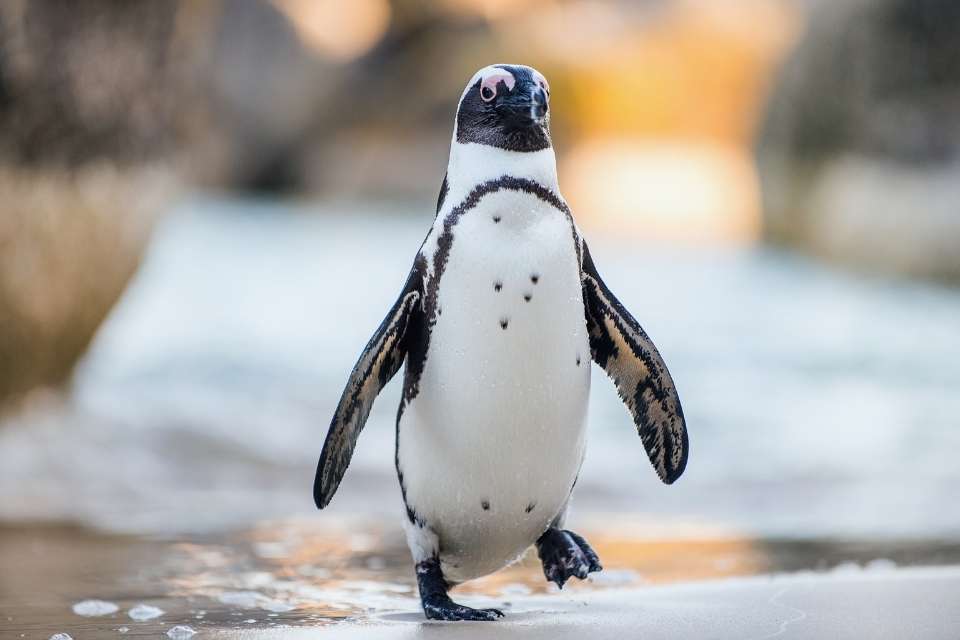Have you ever wondered how long African penguins live? These fascinating creatures have an average lifespan of 20 years in the wild, according to various sources. However, their longevity is under threat due to various factors that have led to a decline in their population.
The African penguin population has decreased by approximately 90 percent since the 20th century, primarily due to global warming, guano and egg collection, oil pollution, and commercial fishing.
As a result, African penguins are currently endangered and their numbers are decreasing.
Key Takeaways:
- The average lifespan of African penguins in the wild is around 20 years.
- Their population has declined by approximately 90 percent since the 20th century.
- African penguins are currently endangered.
- Threats to their survival include global warming, guano and egg collection, oil pollution, and commercial fishing.
- Conservation efforts are crucial to protect African penguins and ensure their survival.
Physical Characteristics and Habitat of African Penguins
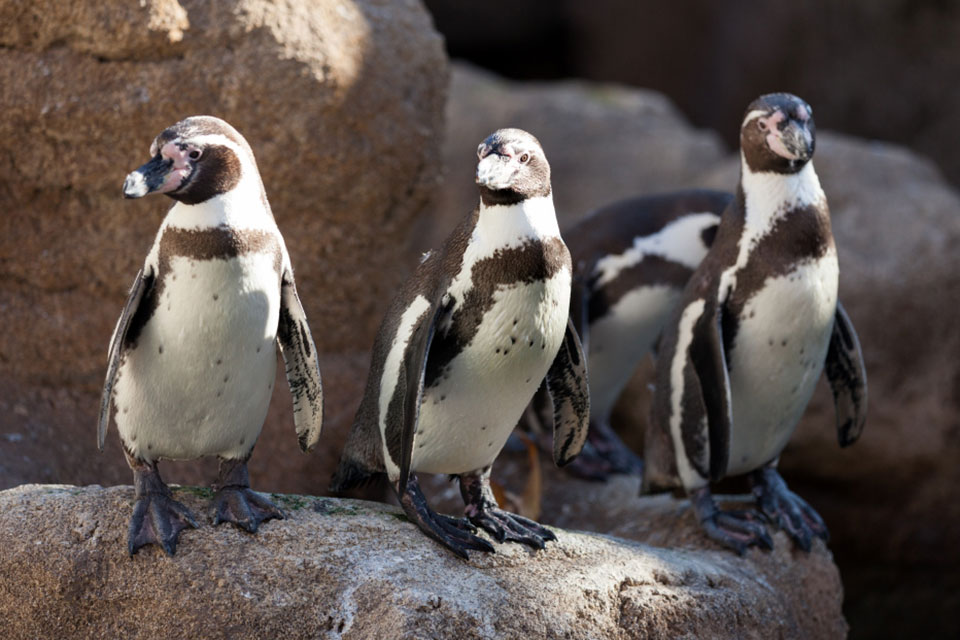
African penguins, also known as black-footed penguins, possess unique physical characteristics that set them apart from other penguin species.
These charming creatures grow to be about 60 – 70 cm tall and weigh between 2 and 5 kg.
One of their most distinguishing features is the black stripe across their chest, accompanied by eye-catching black spots. Additionally, they possess pink glands above their eyes that become even pinker when they’re exposed to hot temperatures.
When it comes to their habitat, African penguins are predominantly found along the coastlines of South Africa, particularly near Cape Town.
They prefer nesting, molting, and resting in coastal areas within 40 kilometers of the shore. Whether it’s on islands or mainland sites, these penguins feel right at home as long as they are near the calming presence of the ocean.
Lifestyle of African Penguins:
- African penguins grow to be about 60-70 cm tall and weigh between 2 and 5 kg.
- They have a black stripe and unique black spots on their chest.
- They possess pink glands above their eyes that become pinker when they’re hot.
- African penguins prefer coastal habitats within 40 kilometers of the shore for breeding, molting, and resting.
- They can be found on islands and mainland sites near Cape Town, South Africa.
When you catch a glimpse of an African penguin waddling along the sandy shores, you can’t help but appreciate the beauty of their physical attributes and their choice of habitat.
These remarkable creatures have adapted to thrive in the coastal environments of South Africa, adding to the richness of our diverse wildlife.
Breeding and Reproduction of African Penguins
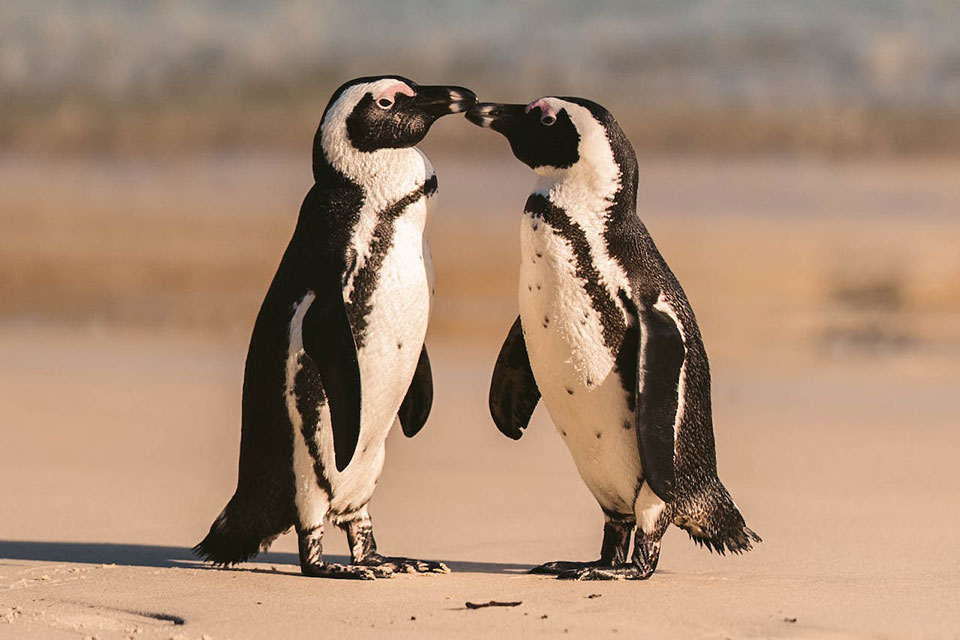
African penguins have fascinating breeding and reproduction behaviors that contribute to their species’ survival. During the breeding season, which typically occurs from May to August, these penguins establish their nests on rocky grounds with minimal vegetation.
They prefer to excavate nest burrows and use guano as the nesting substrate. It’s interesting to note that breeding can happen at any time of the year, with peak seasons varying in different regions.
Once the female penguin lays her eggs, both parents take turns incubating them for about 40 days. This shared parental responsibility is crucial for the survival of the chicks.
After hatching, the chicks are brooded and fed by both parents. It’s amazing to witness the bond between the parents and their young as they provide constant care and protection.
As the chicks grow, they undergo a remarkable transformation. They start to fledge, or develop feathers necessary for flight, at around 60 to 130 days old.
This is a significant milestone in their life cycle, as they become independent juveniles. The fledglings embark on their own journey, adapting to the challenges of their coastal habitat.
Feeding Habits of African Penguins
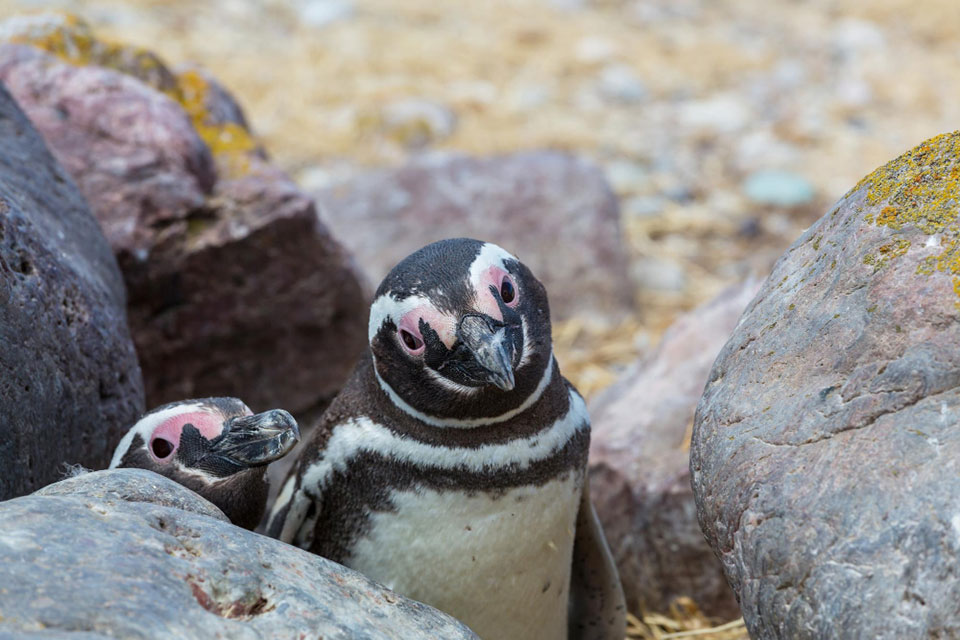
African penguins have unique and fascinating feeding habits that have evolved to suit their coastal habitat. They primarily feed on pelagic schooling fish, with sardines and anchovies being their preferred prey.
These agile birds are skilled divers and can dive to depths of up to 130 meters while foraging. They can stay underwater for 2 to 3 minutes, using their wings as flippers to maneuver through the water with precision.
Not only do African penguins have a taste for fish, but they also consume other marine organisms. Squid and crustaceans such as krill and shrimp are also part of their diet.
These flexible eaters can consume up to 540 grams of prey per day, and when raising older chicks, they may eat over 1 kilogram. Their diet is diverse and varied, allowing them to adapt to changes in prey availability.
Foraging Strategies
African penguins employ various foraging strategies to maximize their hunting success. They often hunt in groups, relying on the safety and efficiency of numbers.
This cooperative behavior allows them to create a whirlpool-like formation in the water, known as a “feeding frenzy,” which helps to concentrate their prey. By working together, they increase the chances of catching fish and reduce the risk of individual predation.
Impacts of Feeding Habits
The feeding habits of African penguins not only sustain their own population but also have implications for the broader marine ecosystem. As predators of small fish and marine organisms, they help to control the populations of these species, maintaining a delicate balance within their habitat.
By studying their diet and foraging behavior, scientists can gain valuable insights into the health and dynamics of the coastal ecosystems where African penguins reside.
Threats to African Penguins
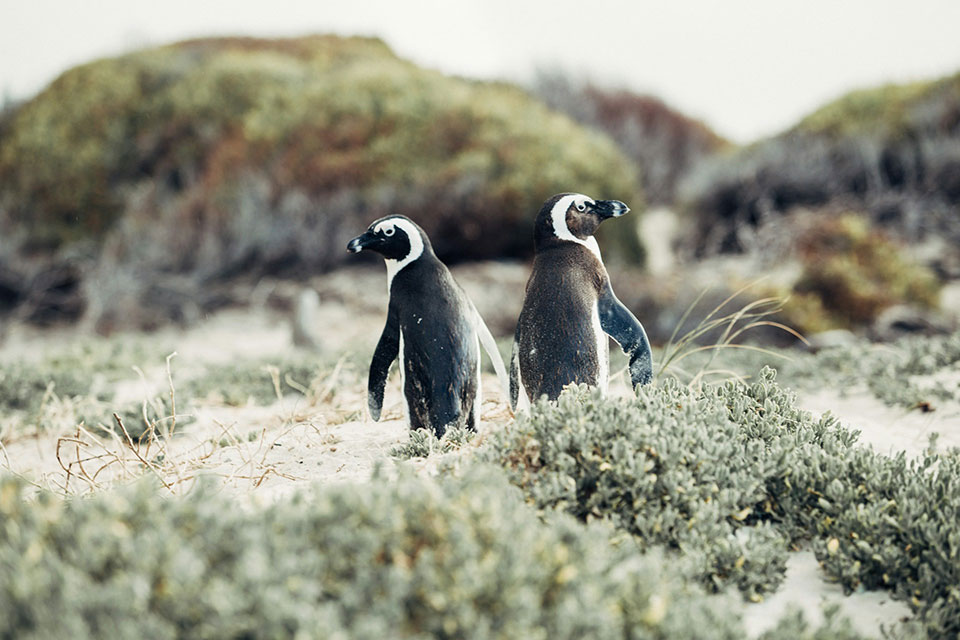
The African penguin population has been facing numerous threats that have contributed to its decline in recent decades. These threats have put the survival of this species at risk, emphasizing the urgent need for conservation efforts.
Here are some of the primary threats that African penguins are currently facing:
- Habitat loss and degradation: Urbanization, coastal development, and human activities have resulted in the destruction and alteration of African penguins’ natural habitats. This loss of suitable breeding and foraging grounds has directly impacted their population.
- Overfishing and depletion of prey resources: Commercial fishing has led to a significant reduction in the availability of pelagic fish, such as sardines and anchovies, which are crucial food sources for African penguins. The decline in prey resources has made it challenging for penguins to find an adequate food supply.
- Oil pollution: Oil spills from shipping accidents and other sources can have devastating effects on African penguins. Oil coats their feathers, impairing their waterproofing ability and exposing them to the elements. This makes them vulnerable to hypothermia, decreases their buoyancy, and hampers their ability to swim and catch prey.
- Predation and competition: African penguins face predation from land-based animals such as mongooses and domestic dogs, as well as from marine predators like sharks and seals. Competition for nesting sites and resources further adds to the challenges faced by these penguins.
It is crucial for us to take immediate action to address these threats and implement effective strategies to protect African penguins. Otherwise, the population decline may continue, potentially leading to their extinction in the wild by 2026.
Conservation efforts to save African penguins
To combat the decline of African penguins, various conservation initiatives have been implemented:
- Establishment of protected areas: Nature reserves and marine protected areas have been designated to safeguard the habitats critical for African penguins’ breeding, foraging, and molting activities.
- Egg collection and slaughter prohibition: Regulations and laws have been put in place to ban egg collection and the slaughter of African penguins, protecting them from human exploitation.
- Oil spill response and prevention measures: Efforts are being made to improve oil spill response capabilities and prevent oil pollution in penguin habitats. These measures involve stricter regulations on shipping activities and the development of more effective clean-up techniques.
- Education and awareness programs: Public outreach initiatives aim to raise awareness about the importance of African penguin conservation and the need for sustainable practices that reduce the threats faced by these birds.
By implementing and supporting these conservation efforts, we can help ensure the long-term survival of African penguins and protect their valuable role in the coastal ecosystems of South Africa.
Conservation Efforts for African Penguins
Conservation efforts are of utmost importance when it comes to protecting the endangered African penguin population.
The decline in their numbers, estimated to have decreased by around 90 percent since the early 20th century, has prompted the implementation of various initiatives aimed at ensuring their survival.
One significant step in conserving African penguins is the establishment of breeding programs in zoos and aquariums worldwide. These institutions play a crucial role in maintaining the genetic diversity of the species and can serve as safe havens for these unique birds.
By carefully managing the captive populations, these programs contribute to the long-term sustainability of African penguins.
Furthermore, several protected sites in South Africa and Namibia, where the penguins breed, have been designated as nature reserves.
These areas are safeguarded to provide a safe environment for nesting, molting, and breeding. Prohibiting activities such as egg collecting and bird slaughter within these reserves helps maintain the stability of the penguin colonies.
Ongoing measures
- Pollution mitigation: Efforts are being made to reduce oil pollution around penguin colonies, as oil spills pose a significant threat to their survival.
- Predator management: Steps are being taken to manage the impact of predators on African penguins, especially on their breeding grounds. This includes measures such as installing fences and using predator deterrents.
- Awareness and education: Raising awareness among local communities and visitors about the importance of African penguin conservation is crucial. Educational programs and information campaigns help foster a sense of responsibility and promote sustainable practices.
By prioritizing African penguin conservation, we can actively contribute to the preservation of this unique species. With continued efforts to protect their habitats, mitigate threats, and raise awareness, we have the opportunity to safeguard the African penguin population for future generations to cherish and enjoy.
Together, we can make a difference in ensuring the survival of these incredible creatures.
The Lifespan of African Penguins in Captivity
African penguins, also known as jackass penguins, are fascinating creatures. While their average lifespan in the wild is around 20 years, penguins in captivity have the potential to live even longer.
In protected environments such as zoos and aquariums, African penguins receive consistent access to food and are safeguarded from natural predators, contributing to their increased longevity.
“African penguins in zoos and aquariums often live into their 30s and 40s,” explains Dr. Mark Anderson, a conservationist at the South African Foundation for the Conservation of Coastal Birds. “These extended lifespans allow us to study the species more closely and learn valuable information that can aid in their conservation in the wild.”
By studying the lifespan and behavior of African penguins in captivity, researchers can gather important data that helps inform conservation efforts.
This knowledge can be used to improve breeding programs, enhance habitat management, and raise public awareness about the threats facing these incredible birds. Together, we can work towards protecting African penguins for future generations to enjoy.
Conclusion
After exploring the lifespan, physical characteristics, breeding habits, feeding habits, and threats faced by African penguins, it is clear that these incredible creatures are in danger. With a drastic decline in their population, they are currently endangered and at risk of extinction in the wild by 2026.
Conservation efforts play a vital role in protecting African penguins and ensuring their survival. By establishing breeding programs in zoos and aquariums worldwide, we are taking active steps to preserve this species.
Additionally, the protection of their breeding sites as nature reserves, alongside the prohibition of harmful activities like egg collecting and bird slaughter, are further measures to safeguard African penguins.
It is essential for us to recognize the importance of conservation and take action to protect these charming creatures. By raising awareness about the threats they face and the need for their preservation, we can contribute to the conservation efforts aimed at securing a future for African penguins.
Let us join hands and work together to ensure the longevity and well-being of these remarkable birds.
FAQ
How long do African penguins live?
African penguins have an average lifespan of 20 years in the wild.
What are the physical characteristics and habitat of African penguins?
African penguins grow to be about 60-70 cm tall and weigh between 2 and 5 kg. They have a black stripe and unique black spots on their chest, as well as pink glands above their eyes that become pinker when they’re hot.
These penguins prefer coastal habitats within 40 kilometers of the shore for breeding, molting, and resting. They can be found on islands and mainland sites near Cape Town, South Africa.
How do African penguins breed and reproduce?
African penguins breed from May through August on rocky ground with little to no vegetation. They excavate nest burrows and prefer guano as the nesting substrate. Breeding can occur at any time of the year, with peak breeding seasons in different regions.
The incubation period for the eggs is around 40 days, and chicks are brooded by both parents. Chicks fledge at around 60 to 130 days old and become independent juveniles.
What do African penguins eat?
African penguins feed on pelagic schooling fish, particularly sardines and anchovies. They also consume squid and crustaceans such as krill and shrimp.
They can consume up to 540 grams of prey per day and may eat over 1 kilogram when raising older chicks. African penguins dive to depths of up to 130 meters and can stay underwater for 2 to 3 minutes while foraging.
What are the threats to African penguins?
African penguins face various threats to their survival, including global warming-induced changes in their habitat, guano and egg collection, oil pollution, and commercial fishing.
These threats have caused a significant decline in their population, with a reduction of approximately 90 percent since the beginning of the 20th century.
What conservation efforts are being made to protect African penguins?
Conservation efforts for African penguins include establishing breeding programs in zoos and aquariums worldwide, protecting South African and Namibian breeding sites as nature reserves, prohibiting egg collecting and bird slaughter, and implementing measures to mitigate threats such as pollution and predation.
How long do African penguins live in captivity?
While their average lifespan in the wild is around 20 years, penguins in protected environments such as zoos and aquariums can live even longer due to consistent food sources and protection from natural predators.

